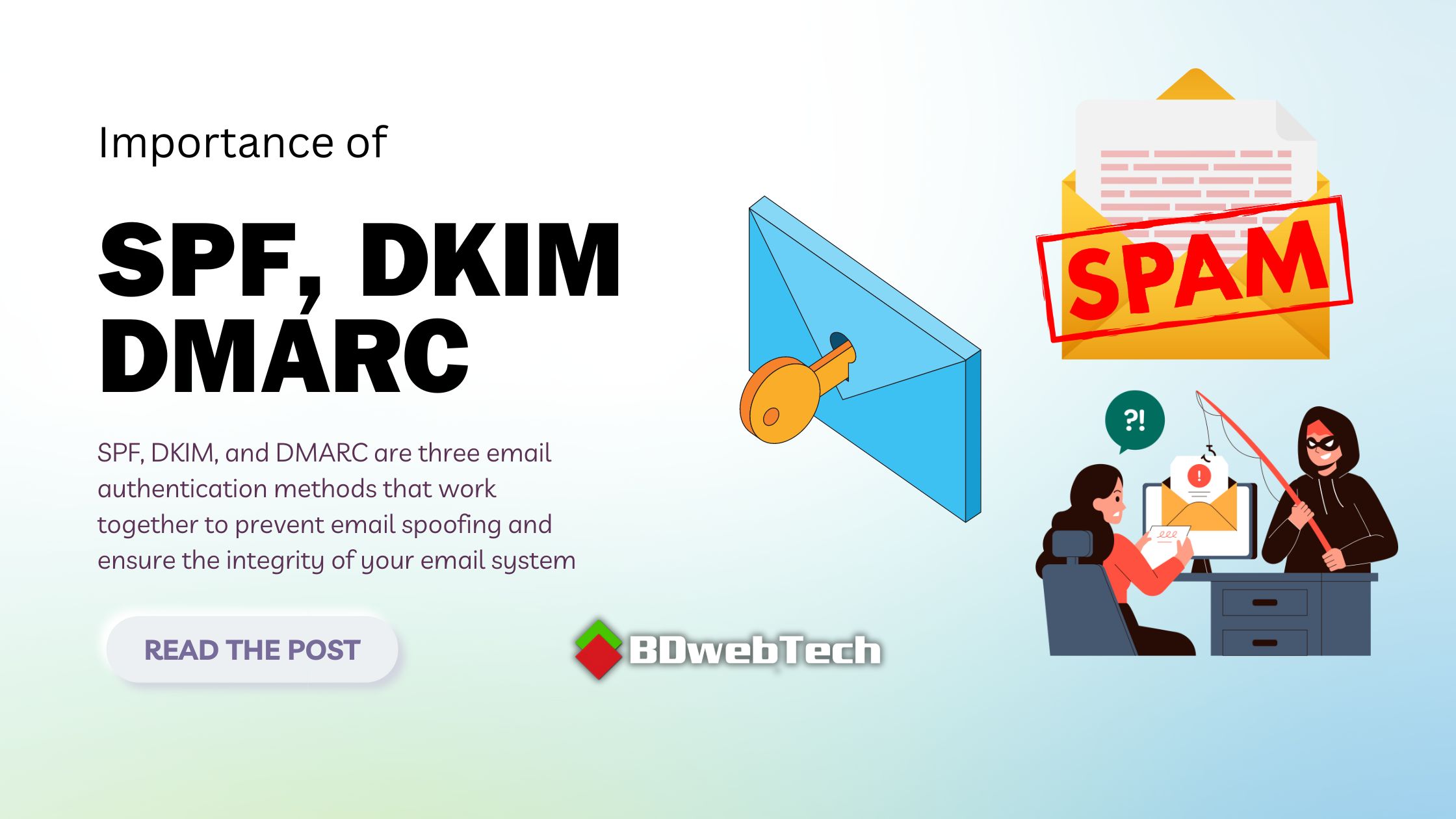Importance of SPF, D...
Importance of SPF, DKIM, and DMARC Records in Email Security

Importance of SPF, DKIM, and DMARC Records in Email Security
Email security is critical for protecting your business and personal communications from spam, phishing, and unauthorized access. SPF, DKIM, and DMARC are three email authentication methods that work together to prevent email spoofing and ensure the integrity of your email system.
1. SPF (Sender Policy Framework)
What is SPF?
SPF is a DNS (Domain Name System) record that specifies which mail servers are allowed to send emails on behalf of your domain. By defining authorized servers, SPF helps prevent email spoofing, where attackers send emails pretending to come from your domain.
How SPF Works:
- When an email is sent, the receiving server checks the SPF record of the sender’s domain.
- If the IP address of the sending server matches the SPF record, the email is marked as legitimate.
- If there is no match, the email is either flagged as spam or rejected.
Why SPF is Important:
- Prevents Domain Spoofing: SPF ensures that only authorized mail servers can send emails from your domain, reducing the risk of phishing attacks.
- Improves Email Deliverability: Correct SPF configuration helps email servers recognize your emails as legitimate, improving your chances of landing in recipients’ inboxes instead of spam folders.
- Brand Protection: SPF helps maintain the credibility and security of your domain by preventing unauthorized users from impersonating your brand.
2. DKIM (DomainKeys Identified Mail)
What is DKIM?
DKIM adds a cryptographic signature to your email headers. This signature verifies that the email was sent by an authorized server and that its content has not been altered during transit.
How DKIM Works:
- A unique pair of public and private keys is generated for your domain.
- The private key signs each outgoing email, and the public key is stored in your domain’s DNS records.
- When a recipient receives an email, their server uses the public key to verify the authenticity of the email’s signature.
- If the signature is valid, the email is accepted as legitimate.
Why DKIM is Important:
- Ensures Email Integrity: DKIM ensures that the email has not been tampered with during transmission, maintaining the integrity of your message.
- Prevents Phishing: By verifying the sender’s identity, DKIM reduces the risk of phishing attacks using your domain.
- Boosts Deliverability: Emails signed with DKIM are more likely to be trusted by receiving email servers, reducing the chances of being marked as spam.
3. DMARC (Domain-based Message Authentication, Reporting & Conformance)
What is DMARC?
DMARC is a policy that builds on SPF and DKIM by instructing email servers on how to handle unauthenticated messages. It provides a mechanism to receive reports about how your domain is being used in email, giving insight into potential misuse.
How DMARC Works:
- DMARC ensures that both SPF and DKIM checks are aligned (i.e., the “From” address in the email matches the domain used for SPF and DKIM authentication).
- If an email fails both SPF and DKIM checks, DMARC provides instructions on what the receiving server should do: reject, quarantine, or accept the email.
- DMARC also sends detailed reports to the domain owner about all emails sent from their domain, including the results of SPF and DKIM checks.
Why DMARC is Important:
- Prevents Spoofing and Phishing: DMARC enforces strict rules on email authentication, making it much harder for cybercriminals to spoof your domain.
- Provides Reporting: DMARC generates reports that help you monitor email usage for your domain and detect any unauthorized activity.
- Improves Trust and Reputation: Using DMARC in conjunction with SPF and DKIM boosts your domain’s credibility and increases trust among email recipients.
How SPF, DKIM, and DMARC Work Together
- SPF verifies that the email comes from an authorized server.
- DKIM ensures the email content is authentic and has not been tampered with.
- DMARC ties SPF and DKIM together, providing a framework for reporting and enforcing policies on unauthenticated emails.
Together, these protocols:
- Protect your domain from being used for fraudulent activities like phishing and spoofing.
- Increase the deliverability of your legitimate emails by improving trust with receiving servers.
- Give you visibility into who is sending emails on your behalf through detailed DMARC reports.
Benefits of Implementing SPF, DKIM, and DMARC:
- Enhanced Security: By using these records, you safeguard your domain against email spoofing and phishing attacks, protecting both your brand and recipients.
- Improved Email Deliverability: Properly configured SPF, DKIM, and DMARC records increase the likelihood of your emails reaching the intended recipients’ inboxes, as most email providers prioritize authenticated emails.
- Better Control and Monitoring: With DMARC reports, you gain visibility into how your domain is being used in email communications and can act quickly to stop unauthorized usage.
- Strengthened Brand Trust: Implementing these email security protocols shows that you prioritize security, which helps maintain your brand’s trustworthiness in the eyes of your clients, customers, and partners.
Conclusion
SPF, DKIM, and DMARC are essential components of a strong email authentication strategy. Implementing these records significantly reduces the risk of your domain being used for malicious purposes like phishing and spoofing, while also improving email deliverability and safeguarding your brand’s reputation.
Let me know if you need further assistance with setting up or configuring these records!
